Serving 789 students in grades 9-12, Staunton High School ranks in the top 50% of all schools in Virginia for overall test scores (math proficiency is bottom 50%, and reading proficiency is bottom 50%).
The percentage of students achieving proficiency in math is 48% (which is lower than the Virginia state average of 54%). The percentage of students achieving proficiency in reading/language arts is 75-79% (which is higher than the Virginia state average of 69%).
The student:teacher ratio of 14:1 is equal to the Virginia state level of 14:1.
Minority enrollment is 38% of the student body (majority Black), which is lower than the Virginia state average of 56% (majority Black).
Quick Stats (2025)
- Grades: 9-12
- Enrollment: 789 students
- Student:Teacher Ratio: 14:1
- Minority Enrollment: 38%
- Graduation Rate: 88% (Btm 50% in VA)
- Overall Testing Rank: Top 50%
- Math Proficiency: 48% (Btm 50%)
- Reading Proficiency: 75-79% (Top 30%)
- Science Proficiency: 55-59% (Top 50%)
- Source: National Center for Education Statistics (NCES), VA Dept. of Education
Top Rankings
Staunton High School ranks among the top 20% of public schools in Virginia for:
Category
Attribute
Percent Eligible For Free Lunch
School Overview
Staunton High School's student population of 789 students has stayed relatively flat over five school years.
The teacher population of 56 teachers has declined by 9% over five school years.
Grades Offered
Grades 9-12
(offers virtual instruction)
(offers virtual instruction)
Total Students
789 students
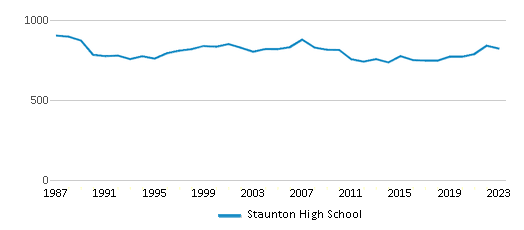
Gender %
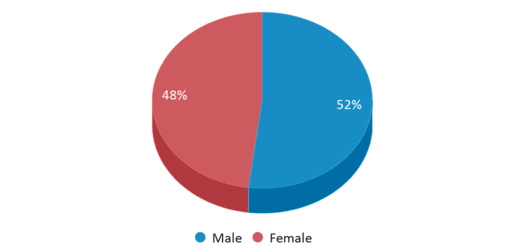
Total Classroom Teachers
56 teachers
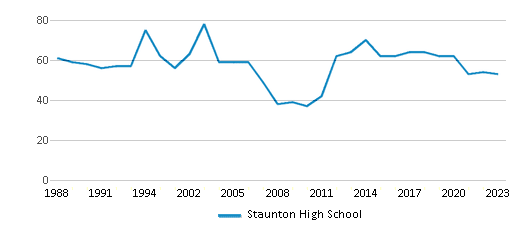
Students by Grade
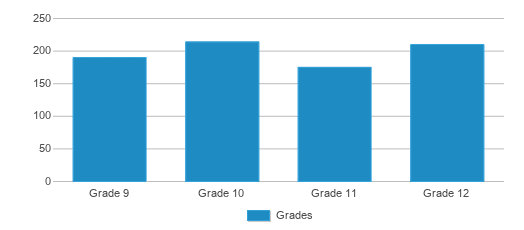
School Rankings
Staunton High School ranks within the top 50% of all 1,792 schools in Virginia (based off of combined math and reading proficiency testing data).
The diversity score of Staunton High School is 0.58, which is less than the diversity score at state average of 0.72. The school's diversity has stayed relatively flat over five school years.
Overall Testing Rank
#809 out of 1792 schools
(Top 50%)
(Top 50%)
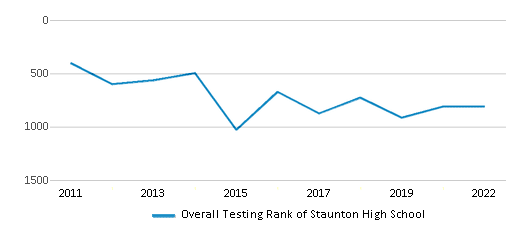
Math Test Scores (% Proficient)
(20-21)48%
54%
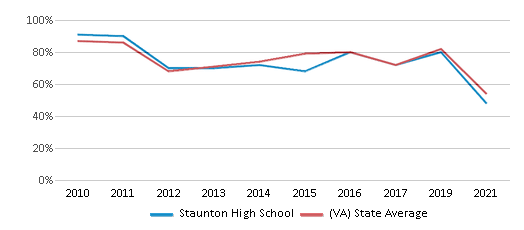
Reading/Language Arts Test Scores (% Proficient)
(20-21)75-79%
69%
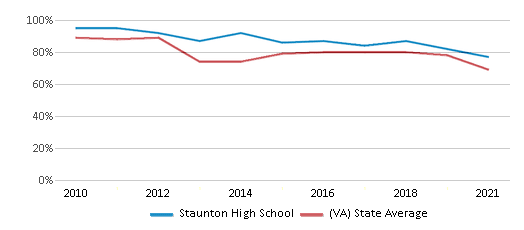
Science Test Scores (% Proficient)
(20-21)55-59%
59%
Student : Teacher Ratio
14:1
14:1
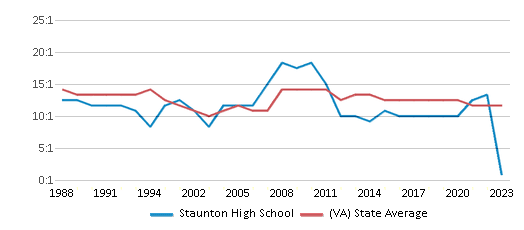
American Indian
n/a
n/a
Asian
2%
8%
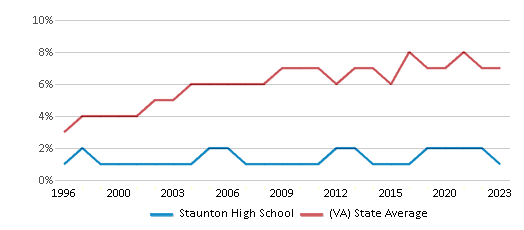
Hispanic
8%
19%
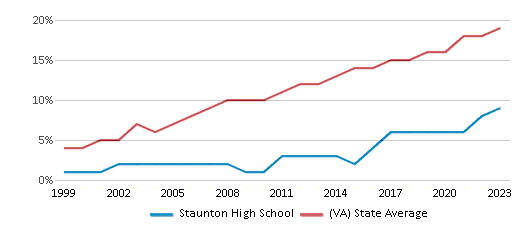
Black
15%
22%
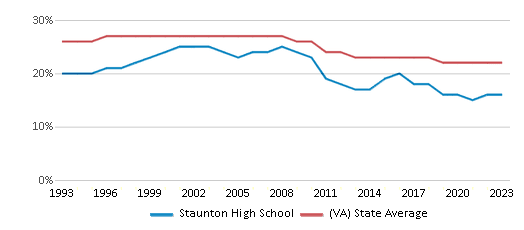
White
62%
44%
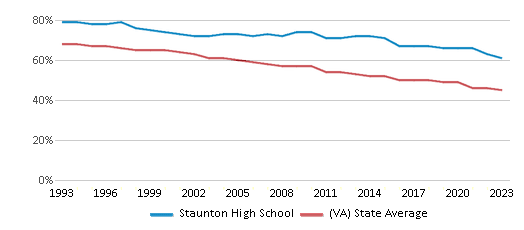
Hawaiian
n/a
n/a
Two or more races
13%
7%
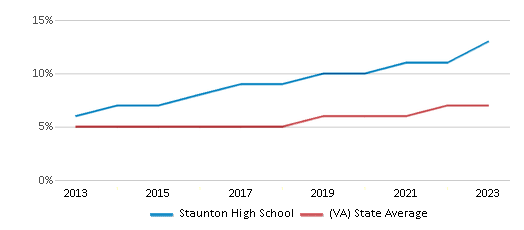
All Ethnic Groups
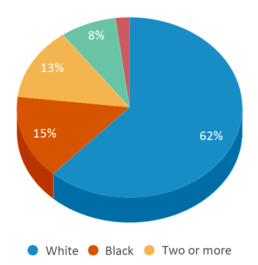
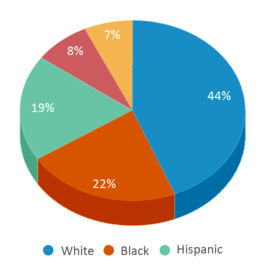
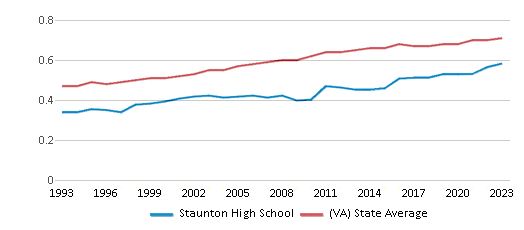
Graduation Rate
88%
89%
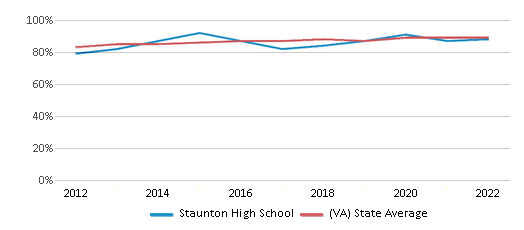
Eligible for Free Lunch
80%
55%
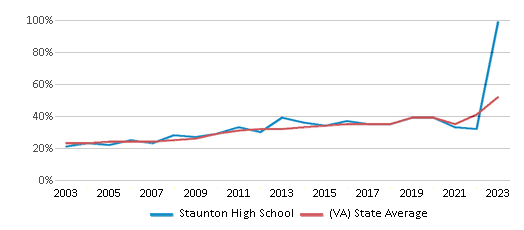
Eligible for Reduced Lunch (21-22)
4%
5%
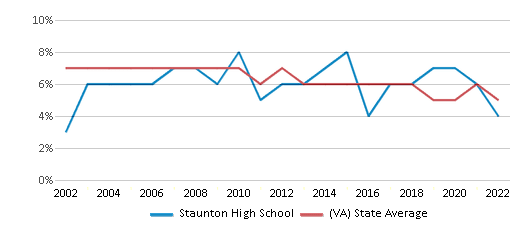
School Statewide Testing
School District Name
Source: National Center for Education Statistics (NCES), VA Dept. of Education
Profile last updated: 02/09/2025
Frequently Asked Questions
What is Staunton High School's ranking?
Staunton High School is ranked #809 out of 1,792 schools, which ranks it among the top 50% of public schools in Virginia.
What percent of students have achieved state testing proficiency in math and reading?
48% of students have achieved math proficiency (compared to the 54% VA state average), while 75-79% of students have achieved reading proficiency (compared to the 69% VA state average).
What is the graduation rate of Staunton High School?
The graduation rate of Staunton High School is 88%, which is lower than the Virginia state average of 89%.
How many students attend Staunton High School?
789 students attend Staunton High School.
What is the racial composition of the student body?
62% of Staunton High School students are White, 15% of students are Black, 13% of students are Two or more races, 8% of students are Hispanic, and 2% of students are Asian.
What is the student:teacher ratio of Staunton High School?
Staunton High School has a student ration of 14:1, which is equal to the Virginia state average of 14:1.
What grades does Staunton High School offer ?
Staunton High School offers enrollment in grades 9-12 (offers virtual instruction).
What school district is Staunton High School part of?
Staunton High School is part of Staunton City School District.
School Reviews
1 3/24/2021
This is a long overdue relating and reckoning for me to speak about my unfair treatment at this HS when I attended from 1998 to 2002. The background and context is key to understand; I have a very large and abusive family who lived in Philadelphia before moving to Staunton in August 1998. The reason my parents gave was to be closer to my sister Jenn who attended MBC through their Pegasus program (teens can skip HS and go straight to college). I was just entering my first year of HS and had to leave behind a lot in Philly such as orchestra and my friends. The very first day of school at R. E. Lee for me I took the bus, but I had to wait 10 minutes to find a seat as the ones fully available were hogged by a large group of AA kids who told me I can't sit with them BC I was white. The bus driver either didn''t hear or didn''t care. I internalized that and blamed myself for their (learned) prejudice and ignorance. Later that day in the lunchroom I was friendly and tried to sit with other kids but nobody was friendly back, rather the opposite. It hurt, but I tried to just push through. The problem was my family was still so abusive, both physically and verbally/mentally. My parents would scream and fight with each other nonstop, my mom would accuse me of things I didn''t do, while neglecting anything that happened to me or my needs as a growing teen. I would be called ugly by my siblings daily. My mom refused to let me learn to drive and get my license as she told me I would crash if I did. I was hit by a car at 15 crossing a winding road in Staunton and she started screaming at me in front of the paramedics that how dare I do this to her as it will cost her money. The continued toll (along with what was happening in the world) culminated in me being so self conscious I skipped an AP Govt class the fall of 2001 by I was afraid if I made a speech in front of everyone they would call me ugly just like my family did. I was so ashamed of the reason (and nobody questioned my family life at all) that I couldnt bring myself to face classmates who were in another class with me so I skipped that class as well. It just kind of snowballed until the HS notified my parents and sent me to an alternative HS to finish the rest of my senior year. The thing is, I wasn't really wanting to skip any class I was severely abused and had no support or validation for it either. My parents made sure we knew not to tell anyone or otherwise we'd be punished more. My older siblings were in college and weren't abused so they denied it or didn''t even care. There was an instance where I didn''t know where to go anymore and didn''t feel safe at home. So I sat on a bench outside the school after it ended. An older, African American male who worked in some capacity at the school approached me and yelled at me for sitting on the bench. Completely glossing over the reason why I did wasn''t nefarious as he attacked me with. It was bc I was so abused I didn''t want to go home. This guy never treated the black students this callous way either. I can never forget it and I know it was the beginning of being directly shamed, blamed and misjudged for what was happening to me and it made me invalidate it myself. I''m writing this to say that I hope they do not treat abused kids this way still and if someone is seemingly acting out, they do ask them about their home life. I wish an adult would have then instead of holding me accountable.
Review Staunton High School. Reviews should be a few sentences in length. Please include any comments on:
- Quality of academic programs, teachers, and facilities
- Availability of music, art, sports and other extracurricular activities
Recent Articles

What Is A Charter School?
Explore the world of charter schools in this comprehensive guide. Learn about their history, how they operate, and the pros and cons of this educational innovation. Discover key facts about charter schools, including admission policies, demographics, and funding, as well as what to look for when considering a charter school for your child.

10 Reasons Why High School Sports Benefit Students
Discover the 10 compelling reasons why high school sports are beneficial for students. This comprehensive article explores how athletics enhance academic performance, foster personal growth, and develop crucial life skills. From improved fitness and time management to leadership development and community representation, learn why participating in high school sports can be a game-changer for students' overall success and well-being.

February 05, 2025
Understanding the U.S. Department of Education: Structure, Impact, and EvolutionWe explore how the Department of Education shapes American education, from its cabinet-level leadership to its impact on millions of students, written for general audiences seeking clarity on this vital institution.





